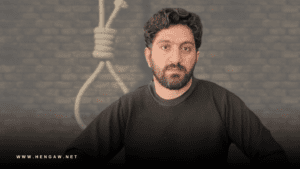In a shocking development that has drawn international condemnation, Iranian authorities have secretly executed Reza Rasaei, a 34-year-old protester associated with the “Woman Life Freedom” uprising. This execution, carried out on August 6, 2024, in Dizel Abad prison, Kermanshah province, underscores the Iranian government’s continued use of capital punishment as a means of silencing dissent through state-sanctioned executions. The case of Reza Rasaei not only highlights the ongoing human rights crisis in Iran but also raises critical questions about the effectiveness and morality of using the death penalty as a tool for political repression.

The Execution and Its Immediate Aftermath
Reza Rasaei, a member of both the Kurdish ethnic minority and the Yaresan religious minority, was executed without prior notice to himself, his family, or his legal representative. This secretive approach to carrying out the death sentence has been widely criticized as a violation of basic human rights and due process. Within hours of the execution, Iranian authorities compounded the tragedy by forcing Rasaei’s family to bury his body in a remote area far from his home, under the watchful eyes of security forces.
The circumstances surrounding Rasaei’s trial and conviction have been described as grossly unfair by human rights organizations. Amnesty International reports that his sentence was based on “confessions” obtained under duress, involving torture and other forms of ill-treatment, including beatings, electric shocks, suffocation, and sexual violence. This pattern of abuse raises serious concerns about the integrity of Iran’s judicial system and its compliance with international human rights standards.
State-Sanctioned Executions: Iran’s Strategy for Silencing Dissent
Rasaei’s execution is inextricably linked to the broader context of the “Woman Life Freedom” uprising that swept across Iran from September to December 2022. This movement, triggered by the death of Mahsa Amini in police custody, represented a significant challenge to the Iranian government’s authority and its policies regarding women’s rights and civil liberties. The government’s response to these protests has been characterized by a harsh crackdown, with Rasaei becoming the tenth individual to be executed in connection with the uprising.
The use of capital punishment as a means of quelling political dissent is not a new phenomenon in Iran, but the scale and intensity of executions have alarmed the international community. According to the Abdorrahman Boroumand Centre for Human Rights in Iran, at least 853 executions were recorded in 2023, with an additional 274 carried out in just the first half of 2024. These numbers reflect a significant escalation in the use of the death penalty, raising concerns about the Iranian government’s commitment to human rights and its willingness to engage in meaningful dialogue with opposition movements.
International Response and Calls for Action
The execution of Reza Rasaei has elicited strong reactions from human rights organizations and the international community. Amnesty International, through its Deputy Director for the Middle East and North Africa, Diana Eltahawy, has condemned the execution as an “abhorrent arbitrary execution” that lays bare the deep-rooted issues within Iran’s criminal justice system. The organization has called for urgent reforms to address these systemic problems and has urged the international community to take action.
One of the key recommendations put forward by Amnesty International is for states to initiate criminal investigations under the principle of universal jurisdiction. This approach would target Iranian officials suspected of crimes under international law, potentially holding them accountable for human rights violations. Such a move would send a strong message that the international community is not willing to turn a blind eye to state-sanctioned executions and other forms of political repression.
Furthermore, there are renewed calls for Iran to establish a moratorium on executions with a view to abolishing the death penalty altogether. This position, long held by Amnesty International and other human rights organizations, has gained additional urgency in light of recent events. The case of Reza Rasaei serves as a stark reminder of the irreversible nature of capital punishment and the potential for miscarriages of justice, particularly in politically charged cases.
The execution of Reza Rasaei represents a critical juncture in the ongoing struggle between civil rights movements and state authority in Iran. By silencing dissent through state-sanctioned executions, the Iranian government risks further alienating its population and damaging its standing in the international community. The “Woman Life Freedom” movement, despite facing severe repression, has sparked a conversation about human rights, women’s rights, and political freedom that extends far beyond Iran’s borders.
As the world grapples with the implications of Rasaei’s execution, it is clear that concerted international action is needed to address the human rights situation in Iran. The use of the death penalty as a tool of political repression not only violates fundamental human rights but also undermines the principles of justice and rule of law. Moving forward, it is crucial for the international community to maintain pressure on the Iranian government, advocating for constitutional, legal, and policy reforms that protect the rights of all citizens, regardless of their political views or ethnic and religious backgrounds.
The case of Reza Rasaei serves as a somber reminder of the human cost of political repression and the urgent need for global solidarity in the face of human rights violations. As long as governments continue to use executions as a means of silencing dissent, the struggle for freedom, justice, and human dignity will remain an ongoing challenge for the international community.
Related News
For Updates
















